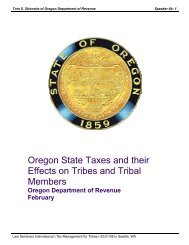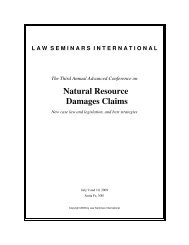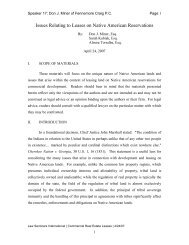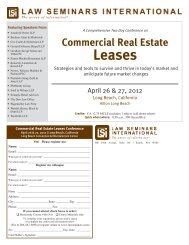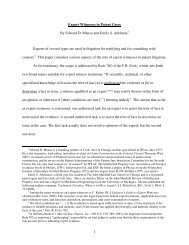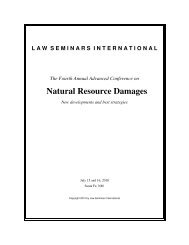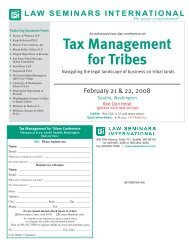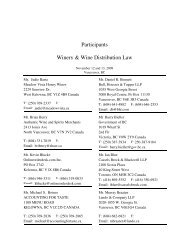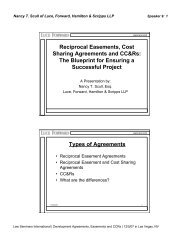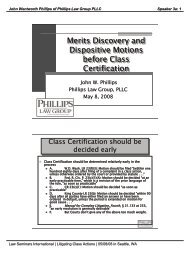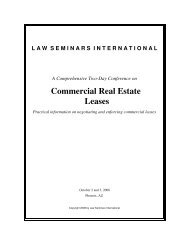LSI 2010 Real Estate Joint Ventures conference materials.pdf
LSI 2010 Real Estate Joint Ventures conference materials.pdf
LSI 2010 Real Estate Joint Ventures conference materials.pdf
Create successful ePaper yourself
Turn your PDF publications into a flip-book with our unique Google optimized e-Paper software.
Brian Todd of Davis Wright Tremaine LLP<br />
Andrew H. Zuccotti of K&L Gates LLP<br />
• In connection with the grant of an interest in the LLC or partnership (other<br />
than a de minimis interest) as consideration for the provision of services to<br />
or for the benefit of the LLC or partnership by an existing member acting<br />
in a member capacity, or by a new member acting in a member capacity or<br />
in anticipation of being a member;<br />
• A distribution by the LLC or partnership to a retiring or a continuing<br />
member in consideration for an LLC or partnership interest; or<br />
• If substantially all the assets of the LLC or partnership consist of stock,<br />
securities, commodities, options, warrants or futures that are regularly<br />
traded on an established securities exchange, then adjustments may be<br />
made in accordance with generally accepted accounting principles<br />
(GAAP). Treas. Reg. § 1.704-1(b)(2)(iv)(f).<br />
This rule permits the capital accounts to be “booked up,” or “marked to market,”<br />
in order that unrealized appreciation or depreciation in LLC or partnership property will<br />
be allocated to the members who owned interests in the entity during the period in which<br />
the appreciation or depreciation occurred. The rule further requires that subsequent<br />
allocations of depreciation, depletion, amortization, gain and loss, as computed for tax<br />
(not book or capital account maintenance) purposes, be determined so as to take into<br />
account the variation between the adjusted basis of the property for tax purposes (which<br />
is not adjusted) and the book value of the property (which is adjusted). This requirement<br />
is imposed so that the tax burden associated with gain in partnership or LLC property, or<br />
the tax benefit associated with depreciation or other loss deductions, follow their<br />
correlative economic benefits and burdens.<br />
C. Liquidating Distributions. The regulations require that liquidating<br />
distributions be made in accordance with the members’ positive capital account balances.<br />
For this purpose, a liquidation means either a liquidation of the entire LLC or partnership,<br />
or a liquidation of the member’s entire interest in the LLC or partnership. In either case,<br />
however, the members’ positive capital account balances are determined after taking into<br />
account all capital account adjustments for the taxable year in which the liquidation<br />
occurs.<br />
D. Deficit Restoration Obligation.<br />
1. In General. The third requirement necessary to satisfy the<br />
economic effect prong of the substantial economic effect safe harbor is that each member<br />
with a deficit in his or her capital account at the time of the liquidation be unconditionally<br />
obligated to restore the deficit by the end of the LLC’s or partnership’s taxable year, or, if<br />
later, within 90 days after the liquidation. However, requiring that each member be<br />
obligated to restore his or her capital account deficit may eliminate the protection from<br />
personal liability afforded LLC members and LLP partners under state law. Limited<br />
liability company agreements and partnership agreements for LLPs therefore typically<br />
provide that the members of the LLC do not have an obligation to restore any capital<br />
account deficit.<br />
Speaker 11: 3<br />
Speaker 12: 3<br />
DWT 12372832v1 0053770-000001<br />
Law Seminars International | <strong>Real</strong> <strong>Estate</strong> <strong>Joint</strong> <strong>Ventures</strong> and Funds | 02/08/10 in Seattle, WA




